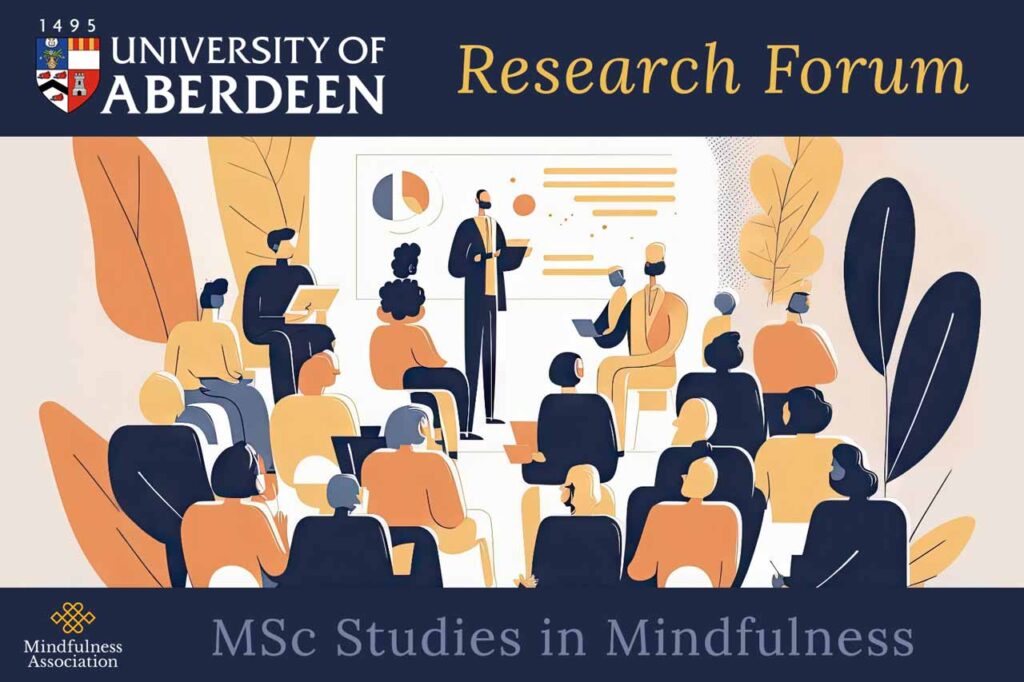
The forum sessions will take place on the second Thursday of each month starting on 15 February 2024 (full list of dates below), and each session will run for one hour between 7 and 8 pm online on Zoom.
The research forum will be hosted by Dr Jane Kellock, herself a graduate of the programme. Each session will be recorded by the Mindfulness Association and uploaded to the research page on the Mindfulness Association website.
We are inviting two graduates to present at each session, giving a 15-minute presentation on their thesis and then taking part in a Q&A for the remainder of their half hour slot:
- 24 October
- 21 November
- 19 December
We hope you will join our research forum sessions – you can do so by clicking the link below.
Find out more about the MSc Studies in Mindfulness
CLICK THIS BUTTON TO JOIN US ON ZOOM
Recordings from Research Forums
Being with Difficult Experiences from Climate Change
Andrew Bruce
Living Abundantly While Dying
Lyndsey Lister
The Potential Role of Mindfulness for Sustainable Development
Emma Östäker
Integrated Information Theory, Interacting Cognitive Subsystems and Micro Phenomenology
David Harrison
Relighting the Fire.
Can Somatic Meditation Influence Burnout Symptoms in Healthcare Professionals
Amanda Scott
Doing No Harm in Widening the Window.
A Systematic Review of the Efficacy of MBIs for PTSD Examining What Works, Why, and What May Need to Be Changed
Jacqueline Moore
Mindfulness and HSE Professionals
Cheryl Gooch
Theorizing on Mindfulness from a Dynamic Systems Theory Perspective
J D Walther
The Value of Fostering Relationships in Stressful Times
Lisa Bolger Hynes
A Phenomenlogy of Self Compassion and Social Work
Martin Kettle
Organisational Compassion in the Cost of Living Crisis
Lorna McDowall
Do Mindfulness Practitioners Show Different Online Patterns to Non-Practitioners?
Louise Haynes
Theorizing on the Mechanisms of Mindfulness from a Dynamic Systems Theory Perspective
JD Walther
Developing Mindful Self-Compassion Coaching Programme for Male Business Leaders: A Pilot Model and Qualitative Analysis
Lou Booth
Mindfulness, Autism and Making Sense
Graeme Nisbet
The role of mindfulness training in combating occupantional stress, building resilience and preventing burnout amongst those training to join the teaching profession
Shirley Gonsalves
Research Abstracts
Everyone Project, Cohort 1
Quantitative Analysis Of Pre And Post Mindfulness Based Living Course Data; Initial Findings.
A summary of results from the pre- and post- MBLC course questionnaires completed as part of the second cohort of Everyone funded projects. This follows on from the research carried out on the first cohort of Everyone projects, and the report produced for this in March 2017.
Download Here
Everyone Project, Cohort 2
Report On The Quantitative Analysis Of Pre And Post Mindfulness Based Living Course Questionnaires.
A summary of the quantitative results from the pre- and post- MBLC course questionnaires returned from the first cohort of Everyone funded projects. 120 pre-course questionnaires were received and 74 post-course, giving 74 paired questionnaires used in the analyses presented.
Download Here
Mindfulness Based Living Course for Young Adults
(MBLC-YA)
Heather Grace Bond completed a PhD programme in Studies in Mindfulness. Heather’s PhD focussed on the potential role of mindfulness and self-compassion in Scottish secondary schools.
For her mixed methods study, Heather created an adolescent version of the Mindfulness Association’s 8-week Mindfulness Based Living Course (MBLC) called the MBLC-YA.
She delivered the intervention to over 200 students across a number of Scottish secondary schools in 2018 and 2019 in a quasi-randomised controlled trial.
Heather also wrote about the transformations from her study in Chapter 6 of Mindful Heroes – stories of journeys that changed lives.
How is the MBLC experienced by marginalised and isolated groups?
(MBLC)
Moira Harris is currently enrolled on the PhD programme. She is continuing the research into the Everyone Project, exploring how the Mindfulness Based Living Course is experienced by marginalised and isolated groups. Some critics of mindfulness argue it has become a commodified palliative that serves to accommodate people to individualistic, consumerist, and corporate values and Moira is curious to explore if the MA’s compassion-focussed approach might offer a more radical, emancipatory potential.
Living A Mindful Life
An Hermeneutic Phenomenological Inquiry Into The Lived Experience Of Secular Mindfulness, Compassion And Insight
Dr. Jane Kellock has just completed her PhD on ‘Living A Mindful Life: An Hermeneutic Phenomenological Inquiry Into The Lived Experience Of Secular Mindfulness, Compassion And Insight’.
You can read more by downloading ‘An Hermeneutic Phenomenological Inquiry Into The Lived Experience Of Secular Mindfulness, Compassion And Insight’
Download Here
Family Carers
Investigation into the negative effects of a caring role on a group of family carers
As part of her MSc Studies in Mindfulness, Jacky Seery conducted an investigation into the negative effects of a caring role on a group of family carers and the impact of a 10-week Mindfulness, Compassion and Qigong Course (MCQC) tailored to meet their specific needs.
As a result, she contributed a chapter to the Mindful Heroes book. The book is a collection of stories of research from MSc Studies in Mindfulness graduates. Profits from the sale of the book are donated to the Everyone Project.
Jacky’s chapter is based on her research study for the MSc and is entitled: Turning Empathic Distress into Compassion – A Hero’s Journey for Family Carers.
You can download a free sample of her chapter from the book here.
The Effects Of The 8-Week Mindfulness Based Living Course (MBLC)
When Delivered To A Mixed Group Of Health Care Staff: A Prospective Pilot Study
There is a substantial body of research that highlights the causes and negative implications that prolonged exposure to stress may have for health care staff (HCS). In an attempt to address this, the current study examined the effects of the Mindfulness Based Living Course on a mixed group of HCS when delivered during the working day. A total of 31 HCS participated in this prospective uncontrolled pilot study. 28 of the 31 HCS (90%) remained in the study and 26 of the 31 (84%) participants completed a minimum of six of the eight weekly sessions.
Download Here
Mindfulness in the Workplace
An Evidence-based Approach to Improving Wellbeing and Maximizing Performance
Mindfulness-based interventions in organisations offer the potential to build individual and organizational resilience, engage employees and address workplace stress. Mindfulness in the Workplace is a practical guide written for practitioners who want to learn how mindfulness can be used as a change management and organisational development strategy.
Download Here
Studies In Mindfulness
Widening The Field For All Involved In Pastoral Care
Mindfulness as practiced and taught in UK Universities, is secular and does not involve or require involvement in any religion or commitment to any particular belief system. That said, secular mindfulness is a form of meditation, and it draws upon Buddhist practices and psychological theory. The inclusion of mindfulness in pastoral care provision in HE requires, therefore, a good understanding of its historical development and the underpinning theory, as well as knowledge of specific practices. As a contribution to developing current practice, approaches and thinking in pastoral care, we aim in this paper to provide a comprehensive overview of the current provision of mindfulness courses within UK Higher Education.
Download Here
Mindfulness Based Living
An Exploratory Study With Health Care Staff
Vida basada en el Mindfulness: estudio exploratorio con el personal sanitaria
Mindfulness based living an exploratory study with health care staff.
Download Here
10th European Conference on Positive Psychology in Reykjavik, Iceland.
29th June – 2nd July 2022
The abstract that was submitted and accepted for presentation at the conference is below:
“Background; Validation of mindfulness courses in terms of benefits, such as reducing stress and anxiety, in diverse populations is key, particularly as they are growing in popularity. The Everyone Project, a collaborative venture between the Mindfulness Association and the Hart Knowe Trust, committed to addressing the diversity in people attending the 8-week Mindfulness Based Living Course (MBLC) across the UK.
Aims; This research aimed to evaluate the MBLC in Cohort 1 and 2 of The Everyone Project.
Methods; 33 courses were delivered to people aged 19-85 with group sizes of between 3 and 21. Participants completed 3 questionnaires which evaluated wellbeing (World Health Organisation 5; WHO-5), current perceived stress (Perceived Stress Scale; PSS-10) and mindful awareness (Mindful Attention Awareness Scale; MAAS) with differences between pre- and post- course scores analysed. Factors influencing course completion and impact were also investigated.
Results; Preliminary data analyses indicate a significant increase across cohorts in the WHO-5 and MAAS and a decrease in PSS-10 post course. Dropout ranged from 0-81.8% and further analyses will investigate specific factors which may have influenced this.
Conclusion; This research shows for the first time that the MBLC increases wellbeing and mindful attention and decreases current perceived stress across diverse populations, suggesting further deliveries of the course would be of benefit to these harder to reach groups. Future research should focus on investigating potential factors influencing dropout further in order to optimise the impact and delivery of 8-week mindfulness courses.”

